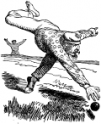Throes
Wild pitch.
Dear Word Detective: A local newspaper writer wrote that someone was “in the throws of despair.” Rather than going ballistic, I sat down and wrote him that I thought that you “throw” a ball, but someone is in the “throes of despair.” Since then, believe it or not, I read the same mistake, “throws of despair,” in a book that was written this year. What gives? Does everyone else know something that I don’t know? Could “throws of despair” really be the correct cliche? — John.
 Gosharootie, you’re right. If one were to Google “in the throws” (with the quotation marks to search for that exact phrase), one would find about 154,000 instances of the phrase online. Many of those, granted, refer to a “throws clause” in computer programming (don’t ask me). But many, many of those hits are folks using “in the throws” where you and I would write “throes.” I even stumbled across a remarkably inept use of both the standard and non-standard “throws” in a single sentence in a newspaper review of a book of short stories called “The Evil B.B. Chow” (“Here another young woman in the throws of a personal crisis throws herself at a middle-aged Chinese computer repairman”).
Gosharootie, you’re right. If one were to Google “in the throws” (with the quotation marks to search for that exact phrase), one would find about 154,000 instances of the phrase online. Many of those, granted, refer to a “throws clause” in computer programming (don’t ask me). But many, many of those hits are folks using “in the throws” where you and I would write “throes.” I even stumbled across a remarkably inept use of both the standard and non-standard “throws” in a single sentence in a newspaper review of a book of short stories called “The Evil B.B. Chow” (“Here another young woman in the throws of a personal crisis throws herself at a middle-aged Chinese computer repairman”).
Confusion of “throe” with “throw” isn’t that surprising, assuming that the writer has never seen “throe” used in print, since the two words are homophones, words that share a common pronunciation. The number of people purporting to write for serious publications who use “throw” for “throe,” however, is a bit distressing. It has been said that a writer is just a reader moved to emulation, but a bit more reading before firing up the old emulator would prevent that sort of flub.
It’s not a very compelling excuse for confusing “throe” (meaning “severe pain or agonizing struggle”) with “throw” (as a verb, meaning “to propel through the air”), but the words may be closely related. We know that “throw” is rooted in the Old English word “thrawan,” which meant “to twist or turn,” and first appeared in English with this meaning, specifically “to torture on the rack.” This “twist” sense of “throw” is retained in modern use of the term “throw a pot” to mean to shape it on a potter’s wheel, but most senses of “throw” in modern English are related, at least metaphorically, to the later “send flying” meaning that emerged in the 13th century.
“Throe,” which is almost always used in the plural (“When a nation is in the throes of revolution, wild spirits are abroad in the storm,” 1856), may hark back to the same Old English “thrawan” root as “throw,” carrying the original sense of “twist, turn” into its modern meaning of “writhe in pain.” But some etymologists trace “throe” to the Old English “thrawu,” meaning “pain,” “pang” or “evil.”
In any case, “throes” is definitely the standard in such phrases as “in the throes of” and “death throes.” Unless you’re writing about a baseball pitcher in the midst of a bad losing streak, “throws of despair” misses the mark.
Page 1 of 2 | Next page
